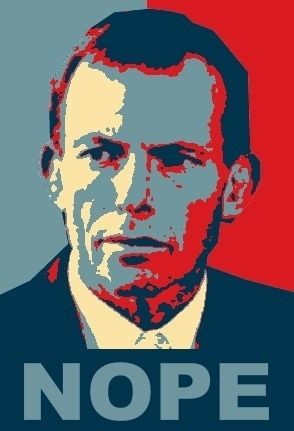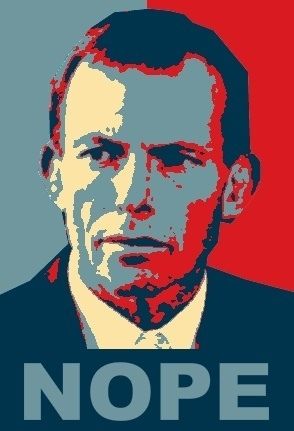As I boarded my flight back to California in Brisbane, Australia, last Wednesday, I received an email alert that the Australian Senate had just defeated the Labor government’s climate change legislation. Only days earlier victory seemed all but assured, allowing Prime Minister Kevin Rudd to go to Copenhagen with an iron-clad, albeit weak, agreement in hand to reduce the nation’s greenhouse gas emissions, which per capita are among the highest in the world.
 New Liberal Party leader Tony Abbott.Photo courtesy cinephobia via Flickr Then in the course of 24 hours the conservative opposition Liberal Party sacked its leader — who had pledged to pass the government’s cap-and-trade legislation — and replaced him with a one-time global warming denier and quickly voted down the government’s Carbon Pollution Reduction Scheme.
New Liberal Party leader Tony Abbott.Photo courtesy cinephobia via Flickr Then in the course of 24 hours the conservative opposition Liberal Party sacked its leader — who had pledged to pass the government’s cap-and-trade legislation — and replaced him with a one-time global warming denier and quickly voted down the government’s Carbon Pollution Reduction Scheme.
The defeat gives Rudd the trigger for an early election that would largely be fought over climate change. (If Parliament twice rejects a government bill, the prime minister can ask that the legislature be dissolved and a snap election called.)
In August, after the Senate first rejected the center-left government’s cap-and-trade legislation, I wrote in Grist that the defeat reflected the peculiarities of the Australian political system rather than the viability of a cap-and-trade system.
I’m not so sure any more after watching the latest reversal unfold during a visit to the Lucky Country.
Just as Australia is the proverbial canary in the coal mine for the environmental affects of climate change, a national election waged over cap-and-trade will offer a preview of voters’ willingness to pull the lever for action on climate change.
The new Liberal Party leader, Tony Abbott, immediately made clear how he’ll fight climate change legislation at the polls, repeatedly labeling cap-and-trade as “a great big new tax.”
That, of course, is the line taken by opponents of the cap-and-trade bill now before the U.S. Congress and has been an effective bludgeon in both countries when used against complicated issues.
Whether that will fly in Australia where climate change is a daily reality is another matter.
 Driving through the parched landscape of southwest Queensland last week, ABC Radio’s live coverage of the Liberal Party coup alternated with updates of bush fires burning in north central Queensland and the neighboring state of New South Wales as well as a report on a rural town down to its last eight hours of water after a heat wave dried up its reservoir. Another story reported on the plight of farmers in Far North Queensland affected by floods that ravaged the region earlier this year at the same time firestorms incinerated swaths of the state of Victoria, killing nearly 200 people.
Driving through the parched landscape of southwest Queensland last week, ABC Radio’s live coverage of the Liberal Party coup alternated with updates of bush fires burning in north central Queensland and the neighboring state of New South Wales as well as a report on a rural town down to its last eight hours of water after a heat wave dried up its reservoir. Another story reported on the plight of farmers in Far North Queensland affected by floods that ravaged the region earlier this year at the same time firestorms incinerated swaths of the state of Victoria, killing nearly 200 people.
Which is why Abbott, known as the Liberal Party’s ideological “head kicker,” took pains to acknowledge the reality of climate change.
“This is not about climate-change science, this is about the mechanism for dealing with it,” said Abbott after winning the leadership battle by a single vote in a party caucus. “We will have a strong and effective new climate change policy, it just won’t involve a great big new tax.”
Or any tax, for that matter. Abbott subsequently said his new yet-to-be-revealed climate change policy will not involve cap-and-trade or a carbon tax.
The man Abbott deposed as party leader, Malcolm Turnbull, on Monday called such a policy “bullshit.”
“Any suggestion that you can dramatically cut emissions without any cost is, to use a favourite term of Mr Abbott, ‘bullshit.’ Moreover he knows it,” Turnbull, the environment minister in the last Liberal government, wrote on his blog. “As we are being blunt, the fact is that Tony and the people who put him in his job do not want to do anything about climate change. They do not believe in human caused global warming. As Tony observed on one occasion ‘climate change is crap.’ “
The internecine battles within the Liberal Party aside, it’s unclear how the tax issue will fare with the Australian electorate. The Australian economy survived the global meltdown relatively unscathed. While exports in this commodity-dependent country suffered, Australia never got hooked on subprime mortgages and its housing market remains strong. In fact, on the day of Abbott’s ascension Australia’s central bank raised interest rates for the third month in a row.
The conventional wisdom among the Australian commentariat is that the Labor government, which must call elections by the end of 2010, will crush the Liberals in a fight over climate change.
For now, though, the Rudd government says it will re-introduce its emissions trading scheme early next year, sticking to the agreement it made with Turnbull to exempt agricultural from cap-and-trade and increase subsidies to polluting industries. The legislation calls for Australia to reduce its emissions by a minimum of five percent below 2000 levels by 2020.
Abbot’s rise to party leader was good news for Australia’s coal and power industries. Coal is a major export and coal-fired power plants supply about 86 percent of the country’s electricity.
But the continuing uncertainty over cap-and-trade has stunted development of a new energy economy as Australian green tech startups fail or decamp for California and other more hospitable climes.
As the government’s climate change legislation blew up, I checked in with Mike Zimmerman, an American expat who recently left his Sydney venture capital firm to start BuildingIQ, a firm that has developed energy management technology for commercial buildings.
“Having a price put on carbon emissions would really increase the return we and other companies focused on energy efficiency provide to customers,” he said in an email. “Instead of basing [return on investment] on cost savings from reduced energy charges and having the ‘soft return’ from decreased emissions, we would actually be able to quantify the dollars saving from the emissions side. It would also open up new revenue opportunities as our customers start to play in the trading ecosystem.”
One Silicon Valley green tech startup that has entered the Australian market seems to have learned how to play the Aussie game. Shai Agassi, founder of electric car infrastructure company Better Place, has shown himself an astute observer of local politics when negotiating deals in various countries.
Better Place Australia hired as its chief executive a former Labor legislator, Evan Thornley, and as its marketing executive a former aide to the premier of New South Wales, Ben Keneally. (On Friday, Keneally’s American-born wife, Kristina Keneally, became the new premier, or governor, of Australia’s most populous state.)
Which goes to show that as the climate change debate moves from the legislature to the electorate, green tech companies’ political savvy will increasingly become as important as their technological know-how.
Spread the news on what the føck is going on in Copenhagen with friends via email, Facebook, Twitter, or smoke signals.


